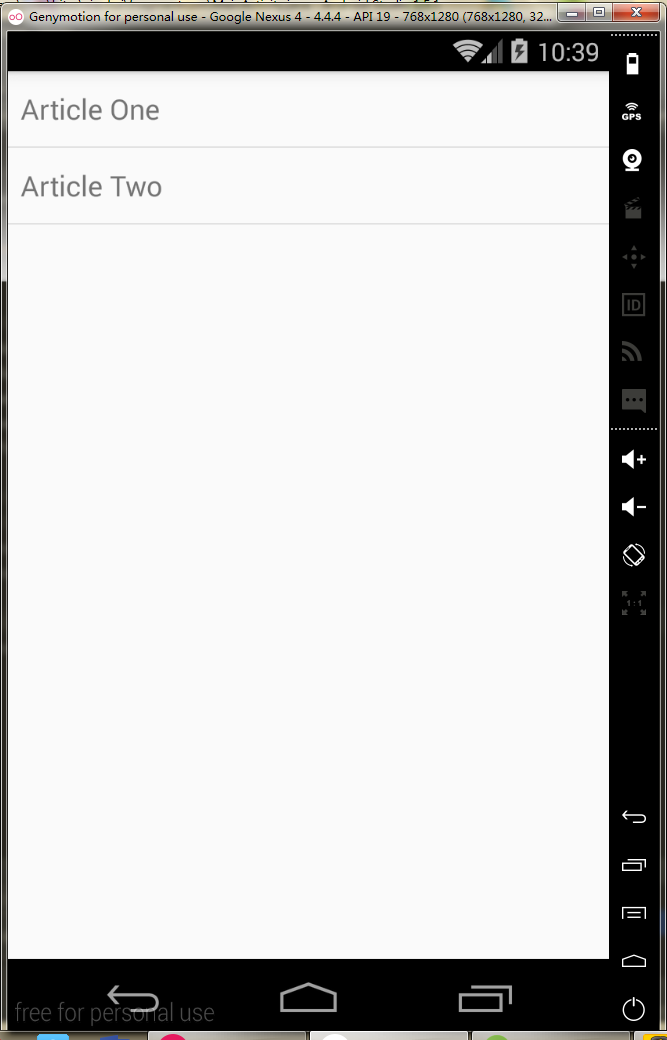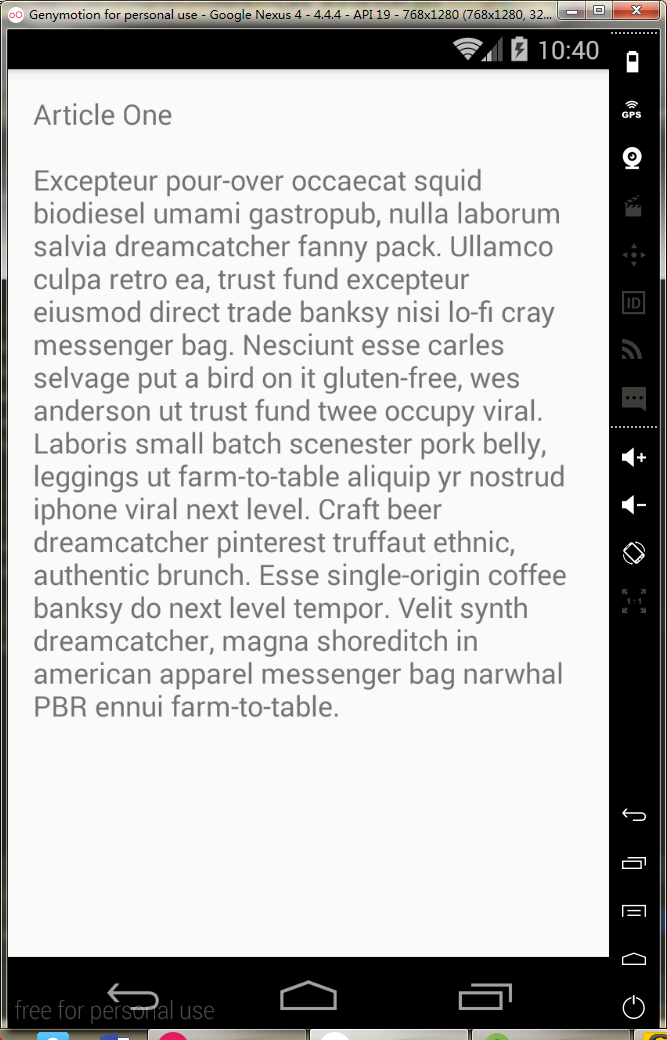學習Android Studio開發工具之Activity2(&Fragment)
阿新 • • 發佈:2019-02-09
開篇先介紹幾個放在眼前卻經常忽視的快捷鍵如圖:
展現出android Studio超強的搜尋能力,提高大工程的開發維護效率。
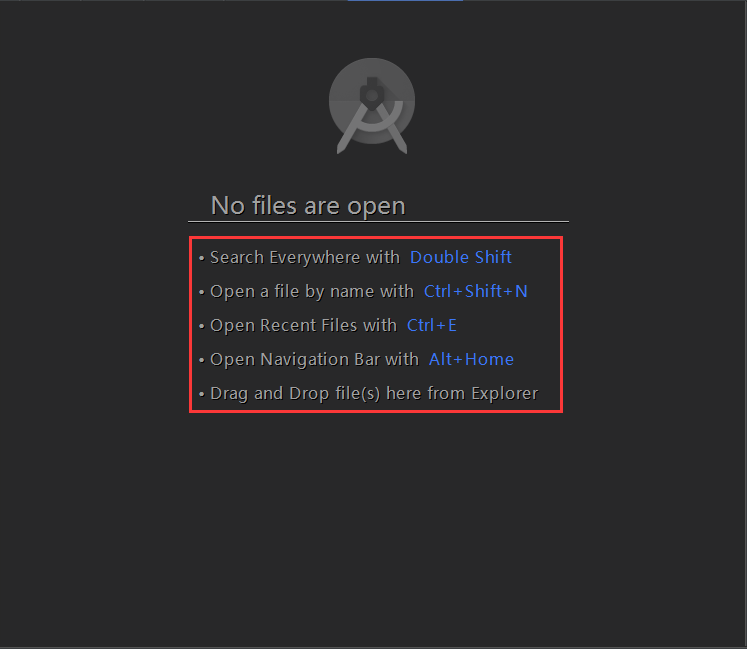
雙擊Shift按鍵效果
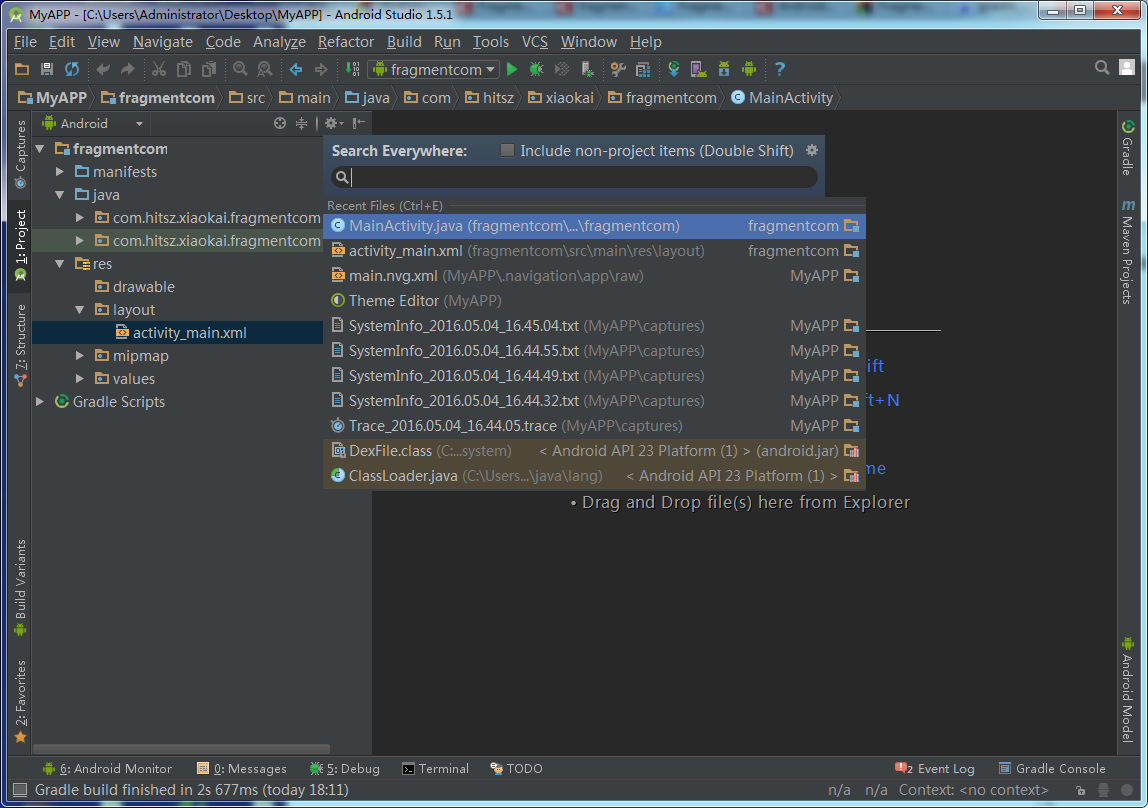
Ctrl+Shift+N 根據檔名開啟檔案
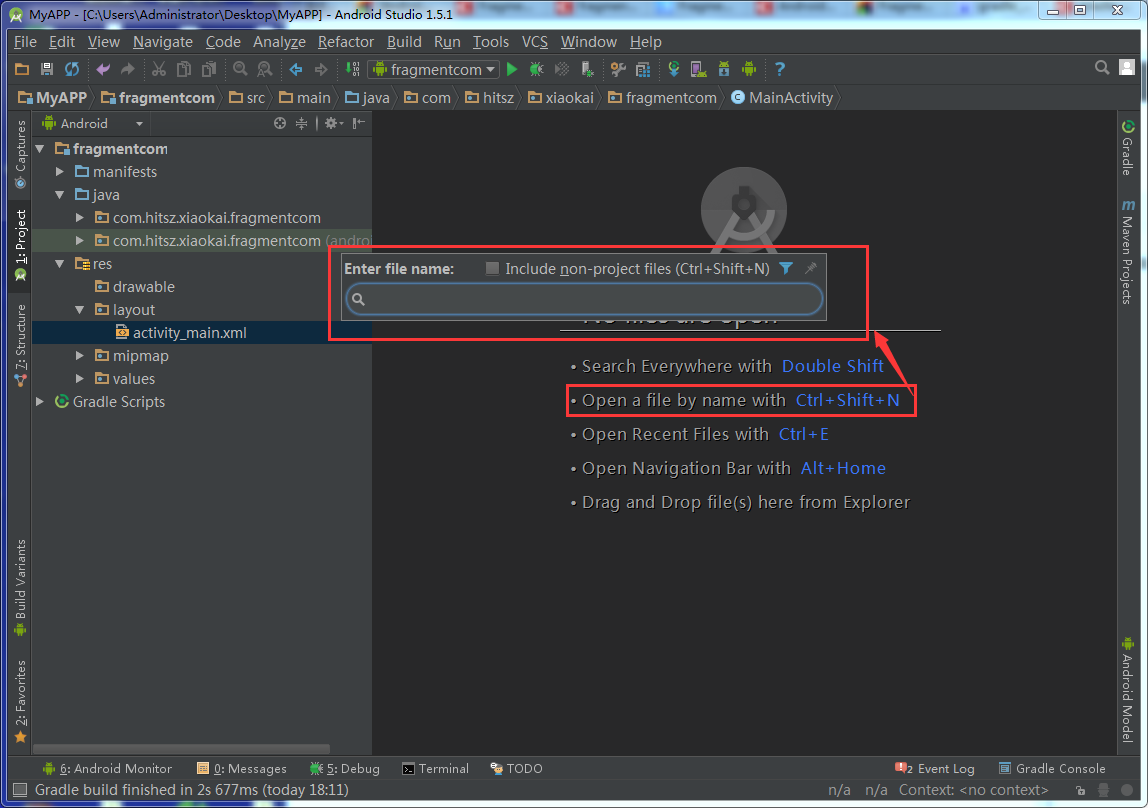
Ctrl+E 開啟最近檔案
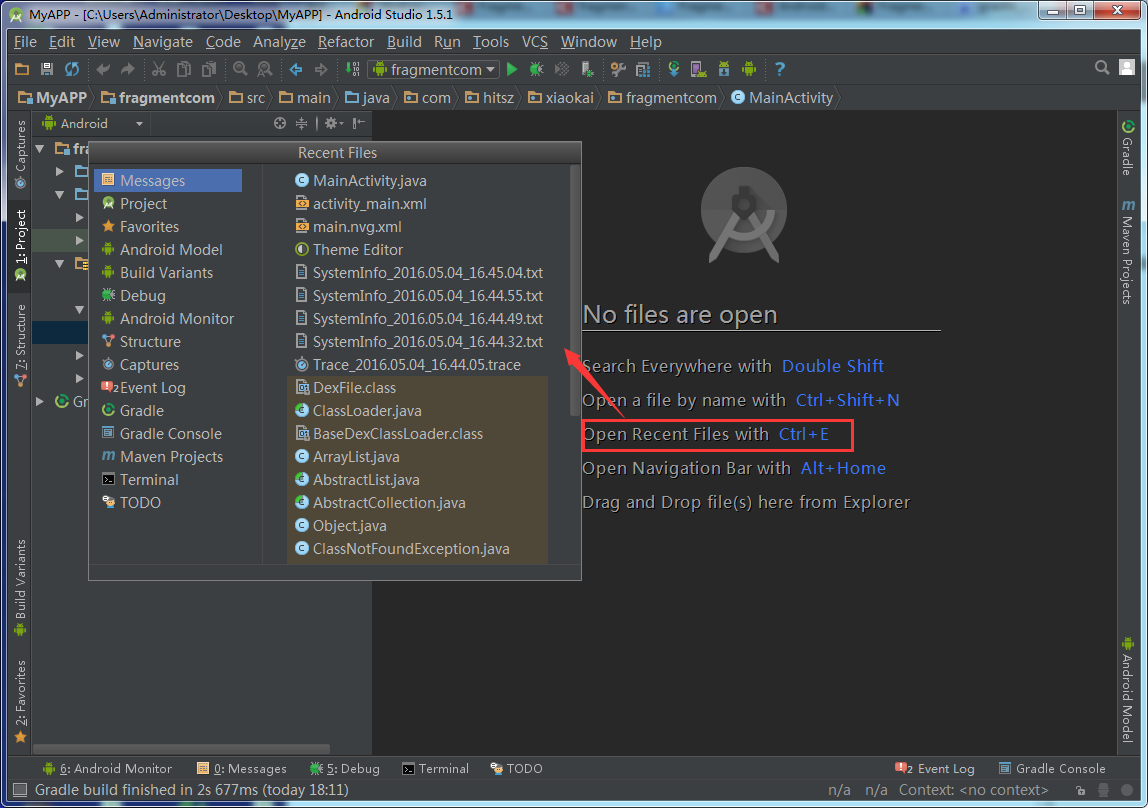
Alt+Home 定位導航欄

本篇是介紹Google推薦使用的fragment以及其與activity的通訊。
新建一個BlankFragment,
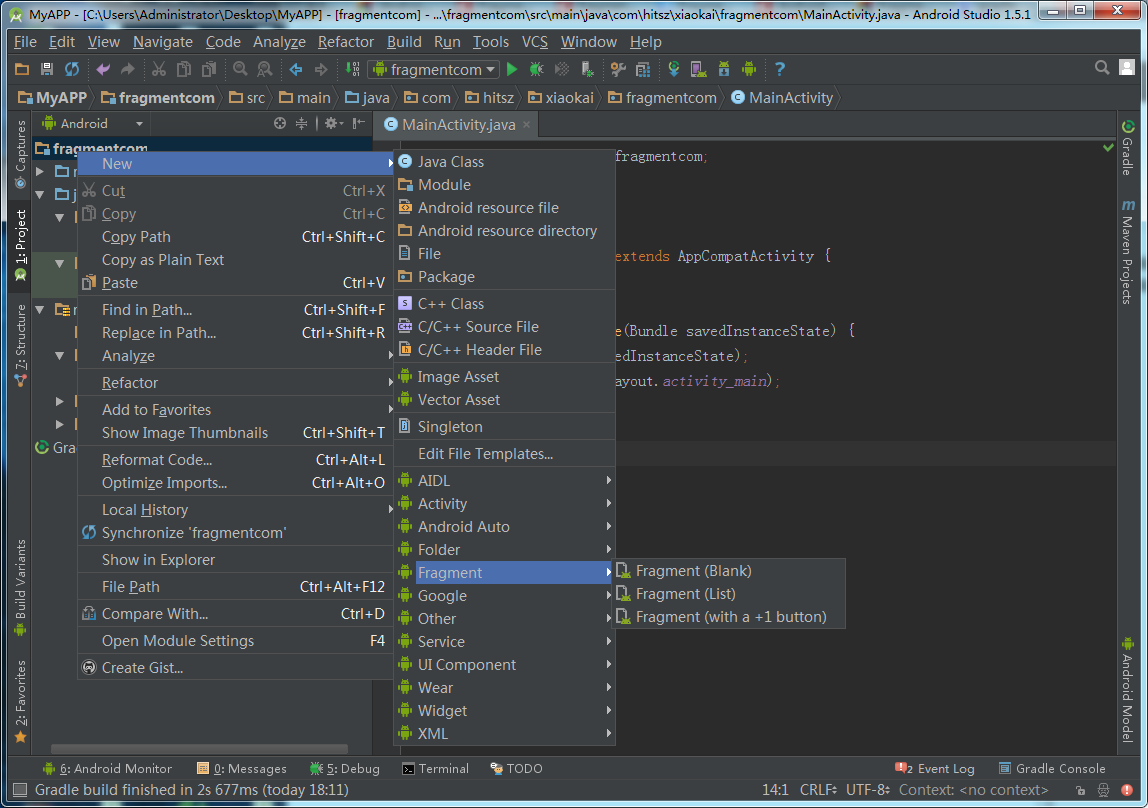
其中自動生成的程式碼如下:
package com.hitsz.xiaokai.fragmentcom;
import android.content.Context;
import android.net.Uri;
import 這裡拿官網給的demo作為演示:
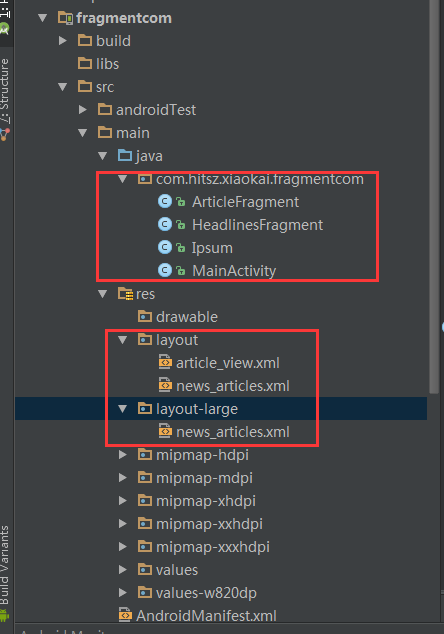
佈局檔案layout/article_view.xml
<TextView xmlns:android="http://schemas.android.com/apk/res/android"
android:id="@+id/article"
android:layout_width="match_parent"
android:layout_height="match_parent"
android:padding="16dp"
android:textSize="18sp" />
layout/news_articles.xml
<FrameLayout xmlns:android="http://schemas.android.com/apk/res/android"
android:id="@+id/fragment_container"
android:layout_width="match_parent"
android:layout_height="match_parent" />
layout_large/news_articles.xml
<FrameLayout xmlns:android="http://schemas.android.com/apk/res/android"
android:id="@+id/fragment_container"
android:layout_width="match_parent"
android:layout_height="match_parent" />
顯示資料Ipsum.java
package com.hitsz.xiaokai.fragmentcom;
public class Ipsum {
static String[] Headlines = {
"Article One",
"Article Two"
};
static String[] Articles = {
"Article One\n\nExcepteur pour-over occaecat squid biodiesel umami gastropub, nulla laborum salvia dreamcatcher fanny pack. Ullamco culpa retro ea, trust fund excepteur eiusmod direct trade banksy nisi lo-fi cray messenger bag. Nesciunt esse carles selvage put a bird on it gluten-free, wes anderson ut trust fund twee occupy viral. Laboris small batch scenester pork belly, leggings ut farm-to-table aliquip yr nostrud iphone viral next level. Craft beer dreamcatcher pinterest truffaut ethnic, authentic brunch. Esse single-origin coffee banksy do next level tempor. Velit synth dreamcatcher, magna shoreditch in american apparel messenger bag narwhal PBR ennui farm-to-table.",
"Article Two\n\nVinyl williamsburg non velit, master cleanse four loko banh mi. Enim kogi keytar trust fund pop-up portland gentrify. Non ea typewriter dolore deserunt Austin. Ad magna ethical kogi mixtape next level. Aliqua pork belly thundercats, ut pop-up tattooed dreamcatcher kogi accusamus photo booth irony portland. Semiotics brunch ut locavore irure, enim etsy laborum stumptown carles gentrify post-ironic cray. Butcher 3 wolf moon blog synth, vegan carles odd future."
};
}導航Fragment,繼承自ListFragment,自帶listview。
HeadlinesFragment.java
package com.hitsz.xiaokai.fragmentcom;
import android.app.Activity;
import android.os.Build;
import android.os.Bundle;
import android.support.v4.app.ListFragment;
import android.view.View;
import android.widget.ArrayAdapter;
import android.widget.ListView;
public class HeadlinesFragment extends ListFragment {
//定義內部介面引用
OnHeadlineSelectedListener mCallback;
// The container Activity must implement this interface so the frag can deliver messages
public interface OnHeadlineSelectedListener {
/** Called by HeadlinesFragment when a list item is selected,當點選list item時回撥,攜帶點選位置資訊
*/
public void onArticleSelected(int position);
}
@Override
public void onCreate(Bundle savedInstanceState) {
super.onCreate(savedInstanceState);
// We need to use a different list item layout for devices older than Honeycomb
int layout = Build.VERSION.SDK_INT >= Build.VERSION_CODES.HONEYCOMB ?
android.R.layout.simple_list_item_activated_1 : android.R.layout.simple_list_item_1;
// Create an array adapter for the list view, using the Ipsum headlines array 建立一個介面卡ArrayAdapter<String>顯示listview內容
setListAdapter(new ArrayAdapter<String>(getActivity(), layout, Ipsum.Headlines));
}
@Override
public void onStart() {
super.onStart();
// When in two-pane layout, set the listview to highlight the selected list item
// (We do this during onStart because at the point the listview is available.)
//根據id獲取Fragment,需要在佈局檔案中使用Fragment標籤載入Fragment
if (getFragmentManager().findFragmentById(R.id.article_fragment) != null) {
getListView().setChoiceMode(ListView.CHOICE_MODE_SINGLE);
}
}
@Override
public void onAttach(Activity activity) {
super.onAttach(activity);
// This makes sure that the container activity has implemented
// the callback interface. If not, it throws an exception.確保依附的activity實現介面
try {
mCallback = (OnHeadlineSelectedListener) activity;
} catch (ClassCastException e) {
throw new ClassCastException(activity.toString()
+ " must implement OnHeadlineSelectedListener");
}
}
@Override
public void onListItemClick(ListView l, View v, int position, long id) {
// Notify the parent activity of selected item
//通知activity選中的item
mCallback.onArticleSelected(position);
// Set the item as checked to be highlighted when in two-pane layout,設為高亮
getListView().setItemChecked(position, true);
}
}顯示詳細內容的ArticleFragment.java
package com.hitsz.xiaokai.fragmentcom;
import android.support.v4.app.Fragment;
import android.os.Bundle;
import android.view.LayoutInflater;
import android.view.View;
import android.view.ViewGroup;
import android.widget.TextView;
public class ArticleFragment extends Fragment {
//Fragment通訊引數
final static String ARG_POSITION = "position";
int mCurrentPosition = -1;
@Override
public View onCreateView(LayoutInflater inflater, ViewGroup container,
Bundle savedInstanceState) {
// If activity recreated (such as from screen rotate), restore
// the previous article selection set by onSaveInstanceState().
// This is primarily necessary when in the two-pane layout.考慮的activity非正常退出,還原狀態
if (savedInstanceState != null) {
mCurrentPosition = savedInstanceState.getInt(ARG_POSITION);
}
// Inflate the layout for this fragment
return inflater.inflate(R.layout.article_view, container, false);
}
@Override
public void onStart() {
super.onStart();
// During startup, check if there are arguments passed to the fragment.
// onStart is a good place to do this because the layout has already been
// applied to the fragment at this point so we can safely call the method
// below that sets the article text.
Bundle args = getArguments();
if (args != null) {
// Set article based on argument passed in
updateArticleView(args.getInt(ARG_POSITION));
} else if (mCurrentPosition != -1) {
// Set article based on saved instance state defined during onCreateView
updateArticleView(mCurrentPosition);
}
}
public void updateArticleView(int position) {
TextView article = (TextView) getActivity().findViewById(R.id.article);
article.setText(Ipsum.Articles[position]);
mCurrentPosition = position;
}
@Override
public void onSaveInstanceState(Bundle outState) {
super.onSaveInstanceState(outState);
// Save the current article selection in case we need to recreate the fragment
outState.putInt(ARG_POSITION, mCurrentPosition);
}
}主activity,MainActivity.java
package com.hitsz.xiaokai.fragmentcom;
import android.os.Bundle;
import android.support.v4.app.FragmentActivity;
import android.support.v4.app.FragmentTransaction;
import com.hitsz.xiaokai.fragmentcom.ArticleFragment;
import com.hitsz.xiaokai.fragmentcom.R;
//實現需要通訊Fragment的內部介面
public class MainActivity extends FragmentActivity
implements HeadlinesFragment.OnHeadlineSelectedListener {
/** Called when the activity is first created. */
@Override
public void onCreate(Bundle savedInstanceState) {
super.onCreate(savedInstanceState);
setContentView(R.layout.news_articles);
// Check whether the activity is using the layout version with
// the fragment_container FrameLayout. If so, we must add the first fragment如果不是xml載入需要使用Fragment事務載入Fragment
if (findViewById(R.id.fragment_container) != null) {
// However, if we're being restored from a previous state,
// then we don't need to do anything and should return or else
// we could end up with overlapping fragments.
if (savedInstanceState != null) {
return;
}
// Create an instance of ExampleFragment
HeadlinesFragment firstFragment = new HeadlinesFragment();
// In case this activity was started with special instructions from an Intent,
// pass the Intent's extras to the fragment as arguments
firstFragment.setArguments(getIntent().getExtras());
// Add the fragment to the 'fragment_container' FrameLayout新增Fragment到activity的主要方法
getSupportFragmentManager().beginTransaction()
.add(R.id.fragment_container, firstFragment).commit();
}
}
public void onArticleSelected(int position) {
// The user selected the headline of an article from the HeadlinesFragment
// Capture the article fragment from the activity layout
ArticleFragment articleFrag = (ArticleFragment)
getSupportFragmentManager().findFragmentById(R.id.article_fragment);
if (articleFrag != null) {
// If article frag is available, we're in two-pane layout...
// Call a method in the ArticleFragment to update its content
articleFrag.updateArticleView(position);
} else {
// If the frag is not available, we're in the one-pane layout and must swap frags...
// Create fragment and give it an argument for the selected article
ArticleFragment newFragment = new ArticleFragment();
//通過bundle攜帶資料,傳遞資料給articleFragment,Fragment之間的通訊方式
Bundle args = new Bundle();
args.putInt(ArticleFragment.ARG_POSITION, position);
newFragment.setArguments(args);
FragmentTransaction transaction = getSupportFragmentManager().beginTransaction();
// Replace whatever is in the fragment_container view with this fragment,
// and add the transaction to the back stack so the user can navigate back 新增返回棧
transaction.replace(R.id.fragment_container, newFragment);
transaction.addToBackStack(null);
// Commit the transaction提交事務
transaction.commit();
}
}
}執行效果:
